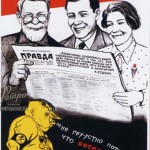 A first rule of deception is truth. All deception works within the context of what is true. All deception works within the context of honesty.
A first rule of deception is truth. All deception works within the context of what is true. All deception works within the context of honesty.
Deception is the deliberate attempt to manipulate the perceptions of the target[1]. This first principle, truth, recognizes that, if deception is to work at all, there must be a foundation of accurate perceptions that can be manipulated. In almost all cases, things are what they appear to be.
Bernard Madoff resembled Warren Buffet in all ways discernible to the naked eye. Each was an investment ‘magician.’
To counter deception is not easy stuff. Counter-deception strategies (discover, assess, counter) are labor intensive. Many lie cheat and steal and we have neither time, money nor energy to uncover them all. We trust. We trust the Firestone Radial tire is safe at any speed. In 1991 we trust US intelligence when it affirmed that Saddam Hussein was not far along in nuclear weapon development; in 2002 we trusted US intelligence which assessed he was far along in reconstituting his nuclear weapons capabilities. Sometimes our trust is well-placed; then again…
The untrained often accuses the deceived of self-deception, an accusation that is often true. We as humans have desires; my desire imposes my desired order on conflicting evidence.
Angry father at bottom of ladder to daughter: “Could you not see he was, is, and always will be a liar and cheat”?
Tearful daughter to father: “He never lied to me…as far as I could tell.”
Much is written about deception, some if it better than others. I read and reread Bennett and Waltz, Counterdeception Principles and Applications of National Security, Massimo Piattelli-Palmarini, Inevitable illusions: how mistakes of reason rule our minds, and anything Robert Jervis publishes at anytime.
In the meantime I am transferring my scattered bibliographies onto RefWorks; my goal is to have most of it up by 15 March 2012.
Counter-deception heuristics (rules of thumb) don’t have Hall of Fame life time batting averages. Counter-deception strategies are labor and time intensive. Let’s see what we can work out over the next few years.
[1] Michael Bennett and Edward Waltz. Counterdeception principles and applications for national security. Norwood, MA: Artech House, Inc., 2007. Print.







